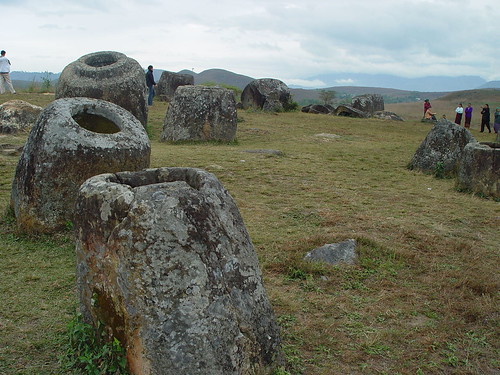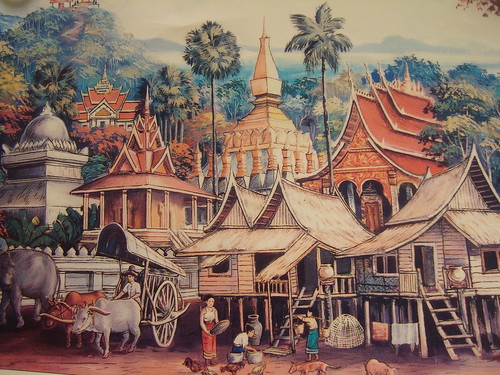Today it's "Babylon Gallery." Originally written in 2002, but not published until it was featured in On The Other Side Of The Eye in 2007, "Babylon Gallery" was one of the more complex speculative poems for me to write from the early 2000s.
In this poem, I was taking a particular risk employing romanized Lao, Hmong, Christian, Buddhist, European mythological motifs to address the issue of Lao unexploded ordnance. The poem is based on a true story regarding a spoon from Laos that an emerging Hmong writer had brought from her recent journey in Xieng Khouang province.

Amid an exhibit featuring the work of artists such as Mali Kouanchao, Vongduane Manivong, Thep Thavonsouk, and others, we placed the spoon on display, with many visitors asking, naturally, if it was really art. The Babylon Gallery was located on 1625 E. Lake Street in Minneapolis until it burned down a few weeks later.
This particular exhibit was the Five Senses Show, which ran from April 12th to May 2nd, 2002, 10 years ago. We learned a lot from that effort. I think we can easily say it set the stage for how we organized our community for the Legacies of War: Refugee Nation Twin Cities exhibit in 2010.
This is probably one the first poem I'd written addressing UXO in Laos. It was also an effort to examine how we might use poetry to confront the subject truthfully, but artfully, especially using elements of speculative poetry.
Today, approximately 26 to 78 million cluster bomblets are still believed to be in Laos, and there is still a thriving market for scrap metal from these and other war materials to create different objects, ranging from spoons to jewelry.
Babylon Gallery
She brought the gray spoon
We hung upon the gallery wall
From the talaat stalls in downtown Phonsavan.
She was supposed to be collecting dab neeg—folktales
And we were showing off art we were so certain
Would change the way the world sees
That stumbled elephant we rode in on.
She was an indelicate work, this buang.
A light cockatrice feather
Crude malice her center
Her bowl an echo of bomb craters
Whispering mad as Gorgon.
"They dine with spoons like this all over there,"
We’re informed.
Hammered from war scraps the dogs
Find indigestible. They sold me this one
Certain it’s American bullets at the core.
"It was time, they said, we took them back."
I pondered how many startled people
This carnivorous spoon passed through
in her previous incarnations,
Karma denying her a role in a finer flatware set for the saints.


